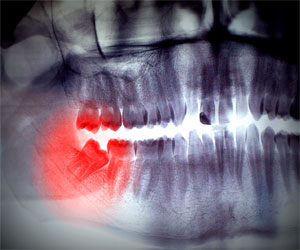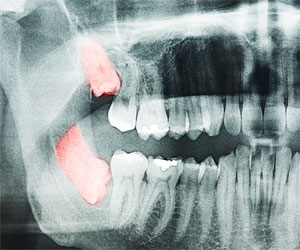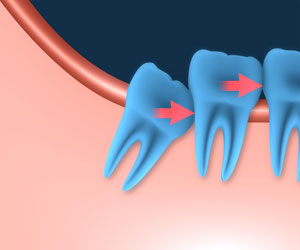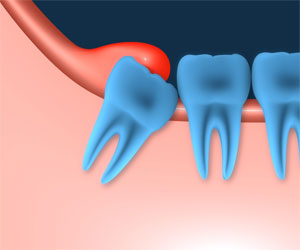General Dentistry Menu
Wisdom Tooth Removal
Avoid infections and crowding of your teeth. Wisdom teeth are the third molars and the last ones in the series of teeth. If they erupt, they come out at the age of 16 to 24 years old. They can be very useful for chewing if they are well aligned. However, in most cases, they do not come out completely; staying impacted in the jaw and should be extracted.
Benefits of a wisdom tooth extraction
- Avoid crowding of your teeth
- Stop recurring infections
- Stop bad breath coming from plaque on your wisdom teeth
- Wisdom teeth are difficult to clean and attract decay more easily
- Wisdom teeth can destroy the healthy adjacent teeth by growing into the wrong direction
- Your mouth will be easier to clean
Indications for Wisdom Teeth Extraction
There are several situations where dentists advise to extract wisdom teeth, whether following an infection, or to avoid future complications.
- When the jaws are not wide enough to allow the wisdom teeth to erupt in an alignment that is useful for chewing.
- When the wisdom teeth are partially erupted, since this allows bacteria to penetrate around a tooth and cause an infection. Partially erupted teeth are also more susceptible to cavities and gum disease since they are more difficult to clean.
- A misalignment of the wisdom teeth can damage the second molars since maintaining good oral hygiene is difficult in this area, making these teeth more vulnerable to cavities and gum disease.
- To reduce the risk of cyst formation that can appear around an impacted tooth.
- The best time to extract wisdom teeth is at the end of adolescence, since the roots may not be completely formed, making the treatment less complicated.
Sometimes a wisdom tooth does not come out completely, creating an extension of gum called an operculum. While eating and chewing on food, this operculum can be irritated and infected causing a pericoronitis. This condition has signs of redness, intense pain, a bad smell and a difficulty of opening the mouth.
If the operculum does not disappear, it is recommended to extract the wisdom tooth to prevent complications of the pericoronitis.
Under certain conditions, if the wisdom tooth has erupted, but an operculum is still present, it is possible to make an operculectomy, which means the removal of the extension of the gum without extracting the tooth.
Origin of the expression “Wisdom Teeth”
It is thought that those teeth are called “wisdom teeth” because they appear in the mouth very late, much later than the other teeth, at an age where people have more wisdom than when they were children, when all the other teeth erupt.
Recovery during the first 24 Hours
- Prolonged bleeding. The bleeding stops soon after the extraction, but some blood might seep out up to 48 hours after the procedure. The bleeding can be controlled by placing cotton gauze in the extraction area and by closing the mouth to create pressure. A wet tea bag can also replace the cotton since the tannic acid that it contains helps the formation of blood clots. Spitting and rinsing should be avoided for the first 24 hours to not dislodge the blood clot and cause a dry socket.
- There can be pain for a few days, therefore pain killers that the dentist prescribes or recommends should be taken.
- If the extraction is complicated, there could be swelling of the face and even change of color of the skin. To reduce the swelling, a bag of ice should be placed on the face for ten minutes, every half hour.
- Soft, lukewarm foods should be eaten during the first 24 hours. Hot drinks and alcoholic drinks should be avoided.
- Brushing the teeth should be continued but the extraction site should be avoided.
Recovery after 24 Hours
- After applying the ice for the first 24 hours, heat should be applied by using a hot and wet towel. The maximum swelling is reached after four days and decreases slowly after.
- Usually an appointment with the dentist is booked a week following the extraction of the wisdom teeth to verify the recovery and to remove the stitches. However, if the stitches are absorbable, they can fall out on their own after a few days.
- It is important to refrain from smoking during the 48 hours following a tooth extraction to avoid severe complications.
- The complete recovery takes three months. However, after one or two weeks, gums will heal enough to be able to comfortably use the mouth in the extraction area.
Possible Complications
- Dry socket. Following the extraction of a tooth, a clot forms on the bone cavity. Sometimes, this clot is dislodged or takes more time to form, creating a condition called dry socket. This situation is characterised by intense pain, a bad taste in the mouth, and sometimes difficulty opening the mouth. It is emphasised by smoking. Dry socket is a temporary condition that lasts a few days and can be relieved by the placement of a dressing soaked in eugenol by a dental professional.
- Very rarely, during the extraction of a tooth, the nerve is touched, causing a loss of sensitivity that usually affects the tongue or the bottom teeth. The loss of sensitivity is rare, and generally temporary, though exceptionally could be permanent.




